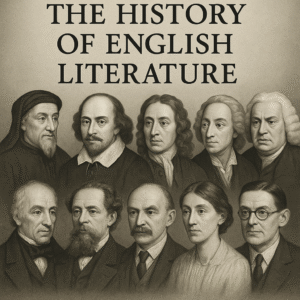IntroductionJames Joyce as Modernist Writer changed literature forever by challenging traditional narrative boundaries. Moreover, his works explore consciousness, memory, and perception with unprecedented depth. He integrated urban life, mythology, and psychology seamlessly, allowing ordinary experiences to reveal universal truths. Consequently, Read More …
Category: The History of English Literature

The History of English Literature offers a rich exploration of the development of literary works from the earliest Anglo-Saxon texts to contemporary masterpieces. This category provides in-depth articles, study guides, quizzes, and timelines covering key literary periods such as the Old English era, Middle English literature, the Renaissance, Neoclassical Age, Romantic Movement, Victorian literature, and Modernist innovations. Whether you are a student, researcher, or literature enthusiast, you’ll find detailed analyses of major writers like Geoffrey Chaucer, William Shakespeare, John Milton, Jane Austen, Charles Dickens, and T.S. Eliot. Discover how historical events, cultural movements, and philosophical ideas shaped the evolution of English literature over the centuries. Enhance your understanding of literary techniques, themes, and genres as you navigate through the fascinating journey of English literary history. This resource is ideal for exam preparation, academic research, and anyone passionate about the legacy of English literary traditions.
W.B.Yeats as Modernist Writer
IntroductionW.B.Yeats as Modernist Writer shaped twentieth-century poetry with vision and change. His art linked Irish tradition with modern doubt successfully. Therefore, his poetry bridges mysticism and modern disillusion. Yeats rejected Victorian ornamentation, seeking sharper rhythms and deeper meaning. Moreover, his Read More …
T.S.Eliot as Modernist Poet
Introduction T.S.Eliot as Modernist Poet stands prominently among the modern poets in English literature. His work profoundly transformed the poetic landscape permanently. Indeed, he established new standards for poetic expression successfully. Moreover, Eliot shaped modern poetry through innovative techniques that Read More …
Absurdism and Theatre of the Absurd
1. Introduction to AbsurdismAbsurdism begins with questions. It examines life, probes meaning, and seeks purpose. Moreover, it encounters silence, discovers emptiness, and embraces confusion. Thus, absurdism grows, expands with thought, and deepens through art. Furthermore, it reacts—reacts to war, reacts Read More …
Existentialism as Modern Literary Movement
Existentialism as modern literary movement emerged in the early 20th century. Writers and philosophers sought to explore human freedom. They examined choice and responsibility. The movement emphasizes individual experience, often confronting isolation, anxiety, and the search for meaning in a Read More …
Stream of Consciousness-Modern Literary Movement
1. Introduction Stream of consciousness explores thoughts as they naturally appear, moreover, it blurs the usual boundaries of time and memory. Consequently, writers effectively reveal a character’s inner life through this continuous flow of thought. Indeed, this specific technique significantly Read More …
Cubism as Modern Literary Movement
Introduction Cubism as Modern Literary Movement reshaped how writers represented reality and perception. Writers used fragmentation, simultaneity, and shifting perspectives to break traditional literary forms. Therefore, readers encountered texts that mirrored modern painting innovations. Consequently, the literary approach emphasized multiple Read More …
Vorticism as Modern Literary Movement
Introduction Vorticism as Modern Literary Movement emerged during early 20th-century Britain, at a time when art, literature, and culture faced rapid transformation. Consequently, the movement responded to industrialization, urban expansion, and technological progress simultaneously. Moreover, it combined visual and literary Read More …
Surrealism as Modern Literary Movement
1. Introduction to Surrealism Surrealism as modern literary movement emerged in the early twentieth century, blending art, literature, and psychology. Furthermore, it emphasized dreams, subconscious impulses, and irrational freedom. Writers used spontaneous expression, while artists created unsettling yet fascinating images. Read More …
Futurism as Modern Literary Movement
Futurism as Modern Literary Movement and Its RiseFuturism as modern literary movement began in Italy. This happened during the early twentieth century. Writers wanted speed, energy, and progress reflected in literature. They rejected the slow traditions of the past and Read More …
